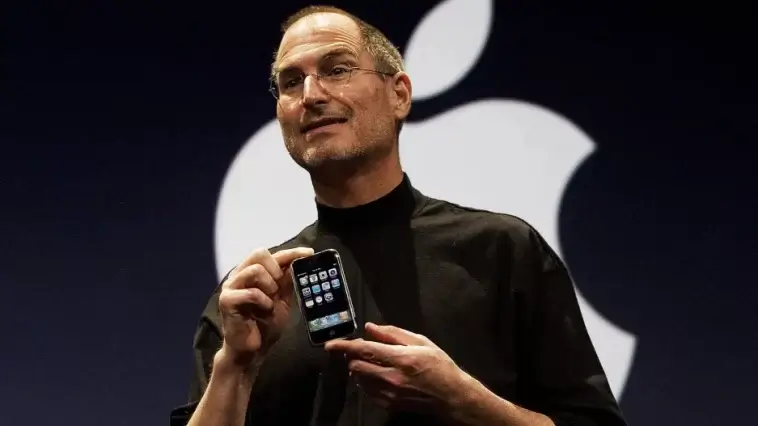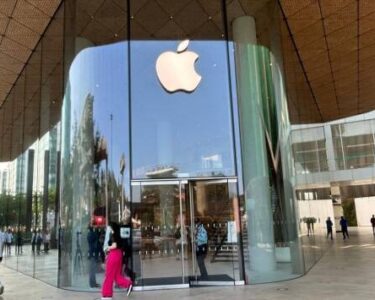As it turns out, history was a tough sell. On January 9, 2007, Steve Jobs unveiled the original iPhone at the Macworld Expo in San Francisco. During his two-hour presentation on stage, Jobs attempted to explain how this new device would completely transform how we all used our phones.
Not everyone bought it. Despite Apple touting it in a press release as a “revolutionary and magical product,” the phone, whose key features at the time were a touchscreen, a full-blown Safari browser, an iPod-inspired music player, and a 2-megapixel camera, wasn’t an immediate hit with many commentators. Skeptics—and there were plenty of them—said the smartphone was too expensive ($499 for the 4GB model), and some decided that it was only available on Cingular (which became AT&T Wireless before the phone was released the following June). Others complained that it came with only a 2G phone. In an age when the world was using flip phones like Motorola’s Razr, the iPhone seemed ambitious, and many questioned whether it would work as advertised.
To be fair, a number of commentators—maybe even the majority—did see the iPhone as transformative, a reinvention of the cell phone as we currently knew it. But many others were skeptical about its prospects, both commercially and culturally. Ten years later, the reactions below are a reminder of how difficult it can be to recognize true innovation when it’s staring us in the face.
THE TECH CEOS
Steve Ballmer in 2007 while he was CEO of Microsoft: “There’s no chance that the iPhone is going to get any significant market share. No chance. It’s a $500 subsidized item. They may make a lot of money. But if you actually take a look at the 1.3 billion phones that get sold, I’d prefer to have our software in 60% or 70% or 80% of them, than I would to have 2% or 3%, which is what Apple might get.”
Former Palm CEO Jon Rubinstein in 2007: “Is there a toaster that also knows how to brew coffee? There is no such combined device because it would not make anything better than an individual toaster or coffee machine. It works the same way with the iPod, the digital camera, or mobile phone: It is important to have specialized devices.”
RIM’s Jim Balsillie: “It’s kind of one more entrant into an already very busy space with lots of choices for consumers . . . But in terms of a sort of a sea change for BlackBerry, I would think that’s overstating it.”
THE JOURNALISTS
“Apple should pull the plug on the iPhone . . . What Apple risks here is its reputation as a hot company that can do no wrong. If it’s smart it will call the iPhone a ‘reference design’ and pass it to some suckers to build with someone else’s marketing budget. Then it can wash its hands of any marketplace failures . . . Otherwise I’d advise people to cover their eyes. You are not going to like what you’ll see.” —John C. Dvorak, MarketWatch
“It is nothing more than a luxury bauble that will appeal to a few gadget freaks. In terms of its impact on the industry, the iPhone is less relevant.” —Matthew Lynn, Bloomberg
“The phone is a gamble on a new business for Apple. And even with its success with the iPod and a reborn line of computers, it has not been immune to marketplace failures, like the Macintosh Cube introduced in 2000” . . . [Jobs] said Apple had set the goal of taking 1% of the world market for cell phones by the end of 2008. That may seem small, but with a billion handsets sold last year worldwide, that would mean 10 million iPhones—a healthy supplement to the 39 million iPods that Apple sold last year. —John Markoff, the New York Times
THE PUBLIC
A comment thread on the tech site Engadget, rediscovered a few years ago by a Reddit user, had similar reactions:
“Apparently none of you guys realize how bad of an idea a touchscreen is on a phone. I foresee some pretty obvious and pretty major problems here.”
“I’m not impressed with the iPhone. As a PDA user and a Windows Mobile user, this thing has nothing on my phone.”
“I’ve got touchscreen buttons on my Samsung i730 and it sucks.”
“I mean it looks pretty but it’s not something I foresee being the next iPod for the phone industry.”
One guy who did get it right was David Myers, the executive chef at the (now closed) Sona Restaurant in Los Angeles, where employees at the time used the Palm Treo. While it’s a bit unclear why the New York Times asked him to chime in on its original story about the phone, Myers told the paper at the time: “It’s like they read our minds. This is the next step in not accepting poor design any longer.”




